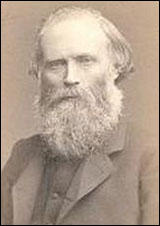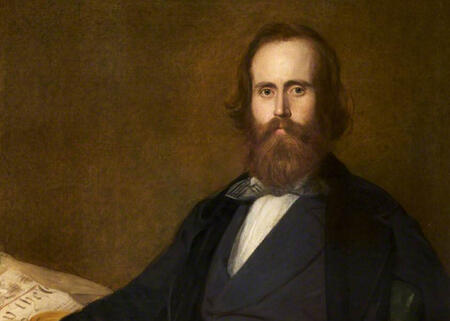Jacob Bright

Jacob Bright, the fourth son in the family of eleven children of Jacob Bright (1775–1851) and his wife, Martha Wood Bright, was born in Rochdale on 26th May 1821. John Bright was his elder brother, and Priscilla Bright was his elder sister.
His father was a self-made and successful cotton manufacturer. He was deeply religious and sent his sons to Quaker schools. This education helped to develop in Bright a passionate commitment to political and religious equality. (1)
Jacob joined the family business in 1842 and with his brother Thomas gradually took over its management. Bright was deeply involved in radical politics and supported the Chartist movement and women's suffrage. (2) Roger Fulford has pointed out: "He (Bright) gained experience of life through a long term of managing the family mill at Rochdale and, in those days when courage was needed to espouse the women's cause, he spoke with all the incisive forthrightness of a business man who knows his own mind." (3)
On 13th September, 1855, Jacob Bright married Ursula Mellor. It was claimed that she was "a strong generous soul, very direct, simple as a child in some ways, yet with a keen brain and fine judgment". (4) Over the next few years she gave birth to five children. Two of the boys died of diphtheria. (5)
The family moved to Manchester "where Bright developed his commercial interests, not only in cotton spinning and carpets, but also in pioneering the introduction of the linotype machine into Britain". The couple continued to be involved in radical politics and campaigned for the parliamentary franchise to both men and women. (6)

In October 1865, Elizabeth Wolstenholme-Elmy established the Manchester Committee for the Enfranchisement of Women. She gained the support of local radical members of the Liberal Party that included Jacob and Ursula Bright. Another active member included Richard Pankhurst, (7)
In November 1867, Jacob Bright was elected to represent Manchester in the House of Commons. Bright now joined forces with John Stuart Mill, another supporter of women's suffrage. In a debate on the 1867 Reform Act, Mill proposed that women should be granted the same rights as men. "We talk of political revolutions, but we do not sufficiently attend to the fact that there has taken place around us a silent domestic revolution: women and men are, for the first time in history, really each other's companions... when men and women are really companions, if women are frivolous men will be frivolous... the two sexes must rise or sink together." (8)
Mill lost his Commons seat in 1868, and Bright became leader of the suffragists in parliament, and took charge of the Women's Disabilities Removals Bill. In 1870 Bright and Sir Charles Wentworth Dilke introduced what was the first women's suffrage bill. In one speech he argued: "I know of no reason for the electoral disabilities of women. I know some reasons, which if there are to be electoral disabilities, would lead me to begin elsewhere than with women. Women are less criminal than men: they are more temperate than men the distinction is not small, it is broad and conspicuous; women are less vicious in their habits than men; they are more thrifty, more provident: they give more to the family, and take less to themselves." (9)
After its defeat he introduced another Women's Suffrage Bill in 1871. Once again, William Gladstone, the leader of the Liberal Party, arranged for it to be defeated and commented that women voting in elections would be "a practical evil of an intolerable character". (10)
Jacob Bright made several attempts to introduce the Married Property Act. These ended in failure and he lost his seat in February 1874. Lydia Becker carried out negotiations with other members of the House of Commons. She was prepared to accept a new clause excluding all married women from the vote. This upset a large number of campaigners. (11)
Bright returned in February 1876 and introduced his last bill in the Commons on women's suffrage in 1878. During the subsequent debates within the women's suffrage movement, he held out for the full franchise demand, including married women, rather than the more limited enfranchisement of widows and single women, that had been advocated by Becker and the more conservative members of the movement. (12)
His wife, Ursula Bright, continued the fight over women's rights and was a member of the executive committee of the Married Women's Property Committee for fourteen years. The passing of the 1882 Married Women's Property Act was acknowledged to have been due to her efforts. Elizabeth Cady Stanton noted "for ten consecutive years she gave her special attention to this bill… was unwearied in her efforts, in rolling up petitions, scattering tracts, holding meetings". (13)
Jacob Bright was accused of being obsessed with the subject of women's suffrage. (14) The Englishwoman's Review commented: "Jacob Bright was not only one of the earliest parliamentary leaders of the women's suffrage movement but throughout the whole of his political career one of its most constant and more courageous champions". (15)
Throughout his political life Jacob Bright was extremely hostile to the Conservative Party. His wife confessed that her husband had a vein of intolerance in political matters: "He could not quite believe in the goodness of a Tory, though his incredulity vanished when he met an opponent in private life". (16)
Jacob Bright died on 7th November 1899 at his home, Nunn's Acre, Goring-on-Thames, Oxfordshire.
Primary Sources
(1) Sylvia Pankhurst, The History of the Women's Suffrage Movement (1931)
Jacob Bright, returned at a by-election, again took charge of the Married Property Act in 1877... The Bill was talked out amid the uproar of its opponents, who drowned the voice of Leonard Courtney, speaking in its support. In 1878 the Bill was again defeated... When Gladstone returned to power in 1880, Jacob Bright had been obliged by ill-health to surrender the bill.
(2) Roger Fulford, Votes for Women (1956)
After John Stuart Mill the conspicuous name among the champions of woman's suffrage in the House of Commons was Jacob Bright. He has been inevitably eclipsed by his famous elder brother, and as in private life he was a shade more worldly so in politics he was somewhat more practical. The young Quaker, Jacob Bright, who once slightly shocked John Bright by staying to watch a dance, and even by organizing a picnic party on First Day had perhaps a shrewder understanding of human beings than his more cloistered brother. He gained experience of life through a long term of managing the family mill at Rochdale and, in those days when courage was needed to espouse the women's cause, he spoke with all the incisive forthrightness of a business man who knows his own mind....
Professor G. M. Trevelyan in contrasting the two brothers has pointed out that Jacob Bright had all his brother's fearless and unyielding temper, together with a greater measure of intellectual daring and suppleness. Speaking with all the authority of Member of Parliament for the potent City of Manchester he seemed to bring to these discussions on the franchise something of the thrust and foresight which had brought riches to the area of England which he represented.
(3) Ray Strachey, The Cause: A History of the Women's Movement in Great Britain (1928)
In 1870, before the country propaganda had been much developed, a second opportunity had arisen to test the feeling in Parliament, and the upshot of that testing was the downfall of all their hopes of immediate success. Mr Jacob Bright secured a day for the introduction of a Suffrage Bill, and Dr Pankhurst drafted it with care, and after a serious and dignified debate on 4th May its second reading was, carried by 124 to 91. But matters ended there. In the committee stage Mr Gladstone brought out his determined opposition, and the majority melted away. "It would be a very great mistake to carry this Bill into law," he said, and though he gave no reasons the whole tone of the House changed forthwith, and when the second vote was taken the hostile majority was 106. So ended the early hopes of parliamentary success. The women realised at last the feebleness of the individual support they had won, and the extent of the opposition they had to overcome.
Student Activities
Child Labour Simulation (Teacher Notes)
1832 Reform Act and the House of Lords (Answer Commentary)
The Chartists (Answer Commentary)
Women and the Chartist Movement (Answer Commentary)
Benjamin Disraeli and the 1867 Reform Act (Answer Commentary)
William Gladstone and the 1884 Reform Act (Answer Commentary)
Richard Arkwright and the Factory System (Answer Commentary)
Robert Owen and New Lanark (Answer Commentary)
James Watt and Steam Power (Answer Commentary)
Road Transport and the Industrial Revolution (Answer Commentary)
Canal Mania (Answer Commentary)
Early Development of the Railways (Answer Commentary)
The Domestic System (Answer Commentary)
The Luddites: 1775-1825 (Answer Commentary)
The Plight of the Handloom Weavers (Answer Commentary)
Health Problems in Industrial Towns (Answer Commentary)
Public Health Reform in the 19th century (Answer Commentary)

